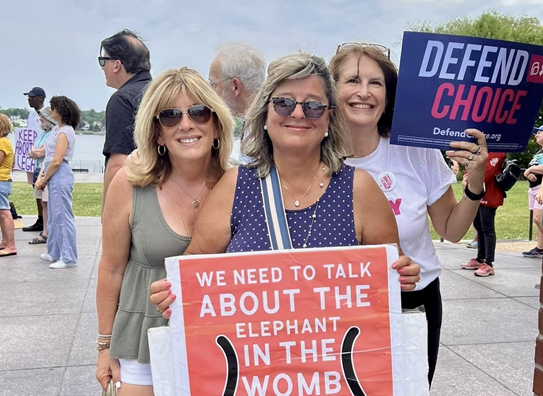
It’s October during a heated presidential election, so of course politicians and their allies are knocking on doors, calling constituents, and mailing glossy materials.
Meanwhile many progressive grassroot groups in New Jersey and around the country have been handwriting postcards for months. Lots and lots of postcards. What’s motivating such people to spend their free time and money writing and mailing postcards this election season?
Maggi Savoca, co-founder of Indivisible OneNJ7 reported that “One NJ7 and our partners have written more than 80,000 Postcards in the last 18 months. We do it out of a concern for our democracy. It has the added benefit of channeling people’s anxiety into action.”
Some of the postcards written by Savoca’s group are advocating for Sue Altman, Democratic House Candidate in New Jersey’s District 7, as well as Andy Kim, New Jersey’s Democratic Senate Candidate. Both are endorsed by Indivisible.
Many activists ordered postcards from groups like Postcards to Swing States, whose mission statement “is to rally Democrats to vote.” Their website states that they are writing 40 million postcards to swing states and competitive US House districts or Florida. Similar groups include Postcards to Voters, Reclaim Our Vote, Georgia Postcard Project, and The Progressive Turnout Project, each touting goals to send out millions of postcards before election day.
Results vary in studies that have explored the effectiveness of hand-written postcards. But most suggest that in highly competitive elections, even the typically reported one-percent impact can flip a race. One such study concluded that “encouraging more eligible voters to register and participate in elections could be as simple as mailing them a postcard,” according to research conducted by the University of Maryland Department of Government and Politics.
In Monmouth County, Karen Piacentini reported that “Our postcard effort has created a community of like-minded people working to save our democracy and to engage people who may otherwise opt not to participate.” Piacentini, a leader in both Greater Red Bank Women’s Initiative as well as Indivisible Two Rivers, added, “We truly feel joy from our action and getting together each week has a powerful purpose.” She noted that the postcard writing group, which will mail out over 18,000 postcards, has grown from about 10 people to over 60 writers each week.
“Postcards are a critical tool for places where it’s difficult to door knock, like gated communities,” noted Lisa Iannucci, who volunteers as a data lead and writes postcards with New Jersey Moms Demand Action, which is affiliated with the national group working to end gun violence. “For folks who are not as mobile or a little shy” writing postcards is an opportunity to help candidates supported by Moms Demand Action. She added that postcards offer a reminder to voters beyond door knocking, phone calling, or candidate-created mail.
“I like postcard writing because it’s so personal,” noted Robyn Filpse, an active member of Jersey Shore Blue in Southern Monmouth County. “I was raised in a time when we wrote thank you notes by hand, wrote letters home from college and summer camp, and even wrote school essays in long hand. When I send a postcard with a handwritten message on it, I think people pause when they retrieve it from their mailbox. They see that someone was on the other end of the pen creating that message, and they read it.”
She added, “I will never meet these people, but I have made a connection with them, and I hope it has an impact on the turnout at the next election.” Filpse’s group Jersey Shore Blue stresses that because activism is personal, opportunities to “do something” include writing postcards, as well as voter registration, phone banking, and canvassing.
“I’m motivated by the lack of civic understanding and general apathy I see in so many people,” said Virginia Adair, who writes postcards with Greater Red Bank Women’s Initiative and Indivisible Two Rivers. “I want to remind them that if they choose to educate themselves and to vote, they do have much control over their futures.”
(Visited 13 times, 15 visits today)
Progressives across the country have been engaging in a unique form of political activism: postcard writing campaigns. These campaigns involve individuals writing personalized messages on postcards and sending them to elected officials, urging them to take action on various progressive issues. But what exactly is driving this surge in postcard writing, and what insights can be gleaned from those involved in the movement?
Insider NJ recently spoke with several progressive activists who have been heavily involved in postcard writing campaigns to get their perspectives on why this form of activism has become so popular. One common theme that emerged from these conversations was a sense of frustration with the current political climate and a desire to make their voices heard in a tangible way.
Many progressives feel that traditional forms of political engagement, such as phone calls and emails, are not as effective as they once were. With elected officials receiving countless emails and phone calls each day, it can be easy for individual voices to get lost in the noise. Postcard writing, on the other hand, offers a more personal and tangible way to communicate with lawmakers.
Additionally, postcard writing campaigns have the potential to reach a wider audience than other forms of activism. Postcards are physical objects that can be shared and displayed, making them a powerful tool for spreading awareness about important issues. By sending postcards to elected officials, progressives are not only advocating for change but also raising awareness among their friends, family, and social media followers.
Another key factor driving the popularity of postcard writing campaigns is the sense of community that they foster. Many progressives find solace in knowing that they are not alone in their activism and that there are others out there who share their values and beliefs. By participating in postcard writing campaigns, individuals can connect with like-minded activists and work together towards a common goal.
Overall, the rise of postcard writing among progressives can be attributed to a combination of frustration with traditional forms of political engagement, a desire for more personal and tangible activism, and a sense of community and solidarity. As the political landscape continues to evolve, it will be interesting to see how postcard writing campaigns continue to shape the progressive movement and influence change on a national level.



